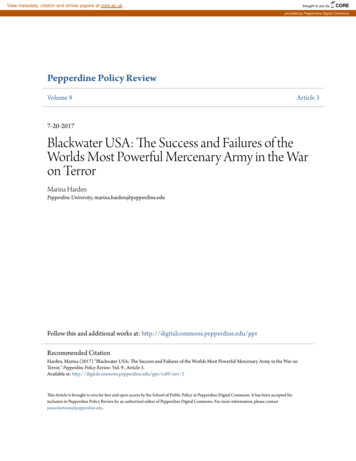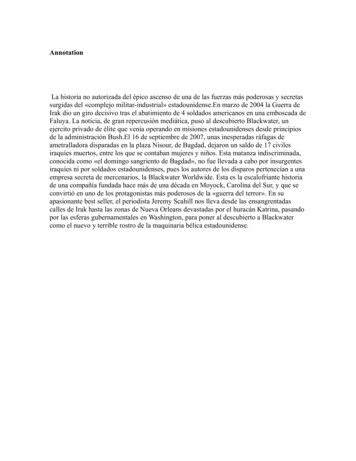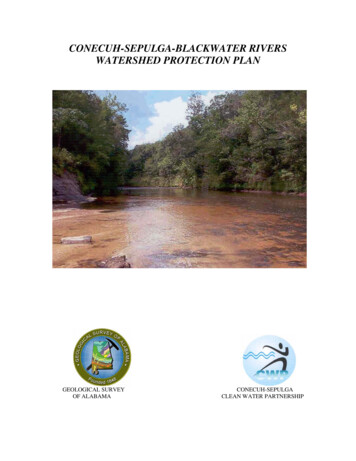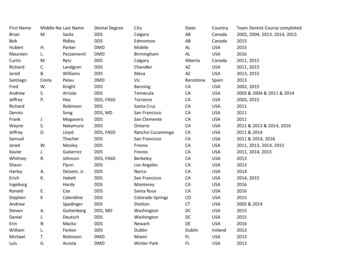
Transcription
View metadata, citation and similar papers at core.ac.ukbrought to you byCOREprovided by Pepperdine Digital CommonsPepperdine Policy ReviewVolume 9Article 37-20-2017Blackwater USA: The Success and Failures of theWorlds Most Powerful Mercenary Army in the Waron TerrorMarina HardenPepperdine University, marina.harden@pepperdine.eduFollow this and additional works at: d CitationHarden, Marina (2017) "Blackwater USA: The Success and Failures of the Worlds Most Powerful Mercenary Army in the War onTerror," Pepperdine Policy Review: Vol. 9 , Article 3.Available at: /3This Article is brought to you for free and open access by the School of Public Policy at Pepperdine Digital Commons. It has been accepted forinclusion in Pepperdine Policy Review by an authorized editor of Pepperdine Digital Commons. For more information, please contactjosias.bartram@pepperdine.edu.
Blackwater USA: The Success and Failures of the Worlds Most Powerful MercenaryArmy in the War on Terror
Beginning of Blackwater USAIn the remote, swampy lands in Moyock, North Carolina, the world’s largestmercenary army made its footprint in 1997. Unbeknownst to founders Erik Prince and AlClark the little town of Moyock would be home to one of the nations most premieretraining facilities for the elite Blackwater USA civilian soldiers. Blackwater USA, alsoreferred to just as Blackwater, would go on to protect, diplomats, dignitaries, andreconstruction officials. Among them were Ambassador Paul Bremer III, then Sen.Barack Obama, then Sen. Joe Biden, Chuck Hagel, and John Kerry1. Blackwater wouldprotect these men and women in battle in the War on Terror at home and abroad. Whilstdoing so, however, the secret mercenary army faced a great amount of tragedy, loss, andcontroversy. The argument as to whether civilian warriors, or secret mercenary armies,who are contracted by the federal government have, and continue, to help the UnitedStates fight the War on Terror with the Middle East became is still a heavily debatedtopic. The story of Blackwater USA is one of continued controversy, skepticism, anddebate that began with a young former Navy SEAL, Erik Prince.As a former Navy SEAL, serving on SEAL Team 8, Erik Prince began hisjourney to creating the most powerful mercenary army in the War on Terror. During histour with SEAL Team 8, beginning in the late 1980s into the early 1990s, Prince sawfault in the President’s defense spending budget2. With the Cold War behind the UnitedStates, the defense spending budget was cut significantly under the Clintonadministration. Prince notes, “ that view wasn’t wrong, and I believe strongly that it isimportant to rain in unnecessary defense spending. But the focus was on the wrongPrince, Erik. Civilian Warriors: The Inside Story of Blackwater and the Unsung Heroes of the War onTerror. (New York: Penguin Group, 2013), 3-4.2 Ibid, 27-28.1
things, because amid that drawdown traditional conflict was quickly giving way tounconventional attacks.”3With his knowledge on defense and the rising use of unconventional attacks,Prince expressed to his SEAL Team 8 members that the peacekeeping failure in Bosniacould have been avoided with “a modest peacekeeping force of United States special opspersonnel.”4 The peacekeeping failure in Bosnia would lead to Prince’s journey towardcreating a new way for special forces to fight current conflicts and, later, the War onTerror. Prince thoroughly expressed wanting to build a “world–class training facility”upon leaving service where special operations personnel could train and learn how tofight the threats brought upon the United States in the late 1990s. Erik Prince had threepeople he initially brought on to form an established Blackwater USA: Al Clark, seniorweapons SEAL instructor who worked with Prince and shared his vision; Jim Dehart, ashooting range expert for the military; and Ken Viera, another former SEAL who wasPrince’s training officer on SEAL Team 8.5 Together the three began creating theBlackwater training facility.The Blackwater training facility was strategically selected on the eastern edge ofthe Great Dismal Swamp in Moyock, North Carolina. Prince focused on placing hisfacility based on its location and radius from surrounding military bases such as NavalAmphibious Base Little Creek, Camp Lejeune, and the Army’s Fort Brad. In addition, thelocation was in close proximity to Virginia and Washington, D.C. where is the CIA andnumerous other intelligence headquarters and the military bases were located. This would3Ibid, 28.Ibid, 29.5 Ibid, 32.4
become the headquarters for Blackwater. The headquarters would consist of everythingthe most elite mercenary army would need: the best shooting range for special forcespersonnel, a bunkhouse, a grass airstrip, special driving track, and ultimately, the mainheadquarters – all of which Prince designated his “Field of dreams.”6Blackwater would break ground in June of 1997 after establishing the location ofthe training facility in Moyock and carefully selecting his handpicked team to run thecompany with Prince. Before the project finished, however, Price brought on a gentlemanby the name of Gary Jackson. Jackson also served two decades as a Navy SEAL whoPrince recalls was good with computers – a valuable asset to a company like BlackwaterUSA at the time and the “final piece of the puzzle.” With Jackson on board, BlackwaterLodge and Training Center officially opened on May 15, 1998.7 Shortly after opening,Prince and his Blackwater team received their first contract that would propel them intothe international private security sector – a contract to train SEAL Team 1 for 25,000.8This would is less than a fraction of what Blackwater would end up bringing in comparedto their largest contract a few years later of protecting Paul Bremer for the StateDepartment while he served as the Ambassador in Iraq. As the Bush and Obamaadministrations would see the importance in privatizing the military and investing inprivate security firms, Blackwater would become the worlds most powerful mercenaryarmy in the war on terror.6Ibid, 32-33.Ibid, 34-35.8 Ibid, 36.7
Successes of Blackwater USABUSH AND OBAMA ADMINISTRATIONSErik Prince had a great amount of support from White House, of which gave himthe ability to obtain support from the Bush and Obama administrations in its operationsabroad. Known to donate generously to the Republican Party, his name and notorietybecame well known in Washington. Prince notoriously had deep ties with the George W.Bush administration during a time when the privatization of military operations weregreatly sought.9 The support for Blackwater from the White House was so great thatwhen “Baghdad’s bloody Sunday” in Nisour Square happened in 2007, none of theBlackwater contractors were immediately prosecuted; rather, they were praised orunmentioned.10 Congress also initially supported the private security firm and dismissedtheir actions as a nonissue despite the fight by several prescient legislators who did notsee the Nisour Square attack as a nonissue.The company served as a sort of “neoconservative Praetorian Guard” for aborderless war launched in the immediate aftermath of 9/11. War correspondent andjournalist Jeremy Scahill states, “Blackwater — despite numerous scandals,congressional investigations, FBI probes and documented killings of civilians in both Iraqand Afghanistan — remained a central part of the Obama administration’s global war9Scahill, Jeremy. Blackwater Founder Remains Free and Rich While His Former Employees Go Down onMurder Charges. (The Intercept, 2014), ltyverdicts/10Scahill, Jeremy. Blackwater: The Rise of the World’s Most Powerful Mercenary Army. (New York:Nation Books, 2007), 18.
machine throughout his first term in office.”11 In addition to the backing of theRepublican Bush White House, Blackwater also was vital to the Obama administration inpost-2008 operations, as the company’s brand and image would change following the2007 Nisour Square incident and subsequent Congressional hearings.BREMER CONTRACTBlackwater USA received much praise for its contract in protecting L. PaulBremer III during the war in Iraq. Dick Cheney’s then Chief of Staff, I. Lewis Libby, andDeputy Defense Secretary Wolfowiz first approached Bremer in April 2003 to undertake“the job of running the occupation in Iraq”.12 Bremer accepted and was shipped off toBaghdad in mid-May, becoming “Bush’s man in Baghdad”. His appointment was boththat of Director of Reconstruction and Humanitarian Assistance and the head of theCoalition Provisional Authority in Iraq.13Bremer’s presence in Iraq was immediately faced with controversy and threat inIraq. His first official initiative after his arrival and appointment in Iraq was, “dissolvingthe Iraqi military and initiating a process of ‘de-Baathification’,” which meant thebanishment of many individuals in Iraq who were members of the Baath party followingthe fall of Iraqi President Saddam Hussein.14 With all of the scrutiny and controversy,Blackwater landed their first major contract with protecting Bremer in Iraq. The Bremercontract with Blackwater was made possible by the neoliberal policies Bremer had11Scahill, Jeremy. Blackwater Founder Remains Free and Rich While His Former Employees Go Downon Murder Charges. (The Intercept, 2014), ltyverdicts/12 Scahill, Jeremy. Blackwater: The Rise of the World’s Most Powerful Mercenary Army. (New York:Nation Books, 2007), 127.1314Ibid.Ibid,129.
advocated for during his career of which he brought to implement in Iraq.15 This contractwas a significant milestone for the private mercenary army. Not only did Blackwaterofficially establish itself with the White House, it also solidified their presence and role inthe War on Terror with the State Department. The company began to market themselveswith: If we can protect the most hated man in Iraq, we can protect anyone, anywhere.16To add to the praise Blackwater was receiving in protecting Bremer in Iraq, theheight of that praise and acknowledgement of the importance of Blackwater came onDecember 6, 2003. Only a few months after Blackwater began protecting Bremer in Iraq,the first publically acknowledged resistance attack on Bremer happened. Bremer had justleft Defense Secretary Rumsfeld off at the Baghdad airport when around 11:00 p.m.Bremer and Brian McCormack, Bremer’s aid, got into their armored SUV to return to theGreen Zone.17 Blackwater would then face one of their most heroic and historicmoments.After Bremer and McCormack got into their Blackwater USA provided armoredSUV, Bremer recalled: Our convoy, as usual, consisted of two ‘up-armored’ Humveessheathed in tan slabs of hardened steel, a lead-armored Suburban, our Suburban, andanother armored Suburban following, and two or more Humvees. Overhead, we had apair of buzzing Bell helicopters with two Blackwater snipers in each”.18 Inside the SUV,Bremer and McCormack were discussing whether Bremer should attend the WorldEconomic Forum in Davos, Switzerland. Bremer was thinking that he “could now usesome of the ski resort pampering” when a “deafening” explosion happened, followed by15Ibid, 133.Ibid, 137.17 Ibid, 138.18 Ibid.16
automatic gunfire. The lead vehicle in the convoy had its tire blown out by an improvisedexplosive device (IED), and resistance fighters were attacking with AK-47s. Accordingto Bremer, a bullet had hit a side window in his SUV. “We’d been ambushed, a highlyorganized, skillfully executed assassination attempt,” wrote Bremer. “I swung around andlooked back. The Suburban’s armored-glass rear window had been blown out by the IED.And now AK rounds were whipping through the open rectangle.” As he sped toward thesafety of the palace, Bremer recalled, “With the stench of explosives lingering in the car,I considered. Davos, all those good meals Francie could fly over and we could ski.That was about as far from Baghdad’s Airport Road and IEDs as you could get”.19The ambassador’s car and Blackwater’s Humvees and helicopters wouldeventually make it back to the Green Zone with no one injured. Bremer wouldcontinuously praise Blackwater for their efforts in protecting him in the Middle East. Thesuccess of the December 2003 attack on Bremer would show the government, and theworld, just how powerful Blackwater was. The company would continue to obtaingovernment contracts and successfully protect United States personnel abroad under theRepublican Bush administration and Democratic Obama administration.Failures of Blackwater USAFALLUJAH 2004The ambush in Fallujah in 2004 by Iraqi militants against four Blackwateroperatives not only shocked the world, but also demonstrated a significant downfall inprivate mercenary operations. On March 31, 2004, four armed contractors, Scott19Ibid.
Helvenston, Jerry Zovko, Wesley Batalona, and Mike Teague began their fateful journeyon orders to deliver kitchen supplies for the food catering company ESS.20The odd job, to say the least, for the Blackwater contractors would begin with adrive down the ill-fated Highway 10 at roughly 9:30 a.m. The highway led right into thenotoriously dangerous city of Fallujah, Iraq, where the convoy of two lightly armoredPajero vehicles would make their way into a congested street, lined with restaurants,souks, and many people. Heading the convoy in the first vehicle was Jerry Zovko andWesley Batalona, followed by Scott Helvenston and Mike Teague in the second. The fourmen looked like your stereotypical CIA operative: white men with guns in a convoy ofarmored vehicles. Though the Iraqi’s continuously stated that if any contractors or CIApersonnel came into the city they would be killed, the unprepared and under armoredconvoy continued into the heart of Fallujah.21Once the Blackwater contractors entered Fallujah, their convoy slowly came to astandstill. Four or five young Iraqi’s then approached the vehicle and began talking to thecontactors right before machine gun fire blew through the convoys. Dozens of Iraqi’scontinued to quickly swarm the vehicles chanting “Allahu Akbar,” unloading rounds intothe vehicles, fatally injuring Helvenston and Teague first. According to eyewitnesses, oneof the men survived only to be pulled from the vehicle and killed by the growing mob. Bythe time Zovko and Batalona realized the other car was being ambushed, it was too late.Batalona hit the gas in an attempt to flee from the mob, but hit the median and ran intoanother vehicle – leaving them in the line of machine gun fire. The two men were also20Ibid, 165-168.21Ibid.
fatally shot and their vehicles looted, doused in gasoline, and set on fire. In what becamethe infamous image from the attack, two of the men’s bodies were hung from the mainbridge that crossed the Euphrates. The image immediately was pasted on everynewspaper and television screen in the United States.22The news of the Fallujah ambush and murders of the four Blackwater contractorssparked outrage in the United States. Justice for the contractors became the priority forthe U.S. – igniting a violent U.S. siege in Iraq. To this day it is speculated why theBlackwater men went on proceeded to take the fateful trip to Fallujah when they wereunprepared, under protected, and were warned by U.S. and Iraqi forces not to proceeddown the deadly highway. The families of Scott Helvenston, Jerry Zovko, WesleyBatalona, and Mike Teague would pursue charges against Erik Prince and Blackwater foryears to come until they were given justice for the Fallujah tragedy.NISOUR SQUARE 2007The attack at Nisour Square in Baghdad on September 16, 2007 marked thebeginning of the end for Blackwater. At approximately 12:08 p.m., Baghdad, Iraq: aheavily armed Blackwater USA convoy entered a busy intersection in the Mansourdistrict of the Iraqi capital.23 The rather upscale part of Baghdad was filled with shops,restaurants, and art galleries where thousands of Iraqi citizens flocked to daily.The Blackwater USA caravan of four heavily armored vehicles, equipped with7.62-millimeter machine guns began to enter the congested intersection. Iraqi policebecame used to allowing U.S. military and armed vehicles pass through the streets bymaking room for their ominous vehicles. Iraqi police and U.S. officials claim that this2223Ibid.Ibid, 17-18
attempt to allow a peaceful pass through of U.S. personnel was to protect the convoysfrom insurgent attacks and protect Iraqi civilians in the case of a firefight.24 Drivingthough Nisour Square that day was a medical student by the name of Ahmed Hathem alRubaie who was driving his mother, Mahasin, after driving his father, Jawad, at thehospital nearby where he worked. At the same time, without notice, the Blackwaterconvoy made an abrupt U-turn placing them on the wrong side of traffic where a man inthe third vehicle of the convoy began to fire his 7.62-millimeter machine gun“randomly”.25Ali Khalaf Salman, an Iraqi traffic cop, was on duty that fateful day. As theBlackwater contractor began shooting “randomly” in Nisour Square, he recalls hearing awoman screaming, “My son! My son!”26. Khalaf found a middle-aged woman inside hervehicle holding her lifeless son, Ahmed Hatham al-Rubaie. He had been shot in theforehead, covered in blood, by the Blackwater convoy shooter. One claim as to why thecontractor opened fire on the vehicle was because it did not stop approaching the convoy;a statement later disputed by scored of witnesses and aerial photos that show the vehiclehad not entered Nisour Square when shot and only continued to enter the Square becausethe driver had not been in control of the car due to his fatal head injury.27As the car continued to move with its incapacitated driver and horrified mother inthe passenger seat, a Blackwater contractor emerged from the fourth vehicle in theconvoy. He began to shoot at the unstoppable vehicle, killing the mother, Mahasin. Shotscontinued to ring out in Nisour Square now from all four Blackwater convoys, so much24Ibid.Ibid.26 Ibid.27 Ibid.25
so that the vehicle Ahmed and Mahasin were killed in exploded into flames. Once theshooting ceased, fifteen vehicles had been destroyed, seventeen Iraqi civilians killed, andover twenty civilians wounded. It was later discovered that not only was shooting comingfrom the Blackwater convoy that day, but from Blackwater’s Little Bird helicopters aswell. The helicopters were responsible for also shooting at the vehicles in Nisour Squareand several Iraqi causalities.28The immense negative response to the massacre of Iraqi civilians in Iraq endedBlackwater’s presence in the country. The pro-U.S. Iraqi government responded withintwenty-four hours: Iraq’s Interior Ministry expelled Blackwater from the country andPrime Minister Nuri al-Maliki labeled the companies actions “criminal.” According toJeremy Scahill, for the Iraqi government “Baghdad’s bloody Sunday” was the “finalstraw” for Blackwater presence in Iraq.29Prince argues that the most misunderstood issue against Blackwater was thecontractors’ “rule of engagement” in Iraq or wherever they may be working. The rules ofengagement in any circumstance are vaguely defined as, “ effectively the necessaryresponse gradations before lethal force is authorized”.30 Prince disagree with Scahill thatBlackwater USA does not have rules of engagement and there are no restrictions forcontractors in Iraq.31 Though Prince does state that his men were not subject to theDepartment of State’s defined rules of engagement, Blackwater USA contractors werestill required to follow other force policies that allowed the contractors to act as they did28Ibid.Ibid.30 Prince, Erik. Civilian Warriors: The Inside Story of Blackwater and the Unsung Heroes of the War onTerror. (New York: Penguin Group, 2013), 211.2931Ibid, 212.
in Nisour Square. One of these policies, Embassy Baghdad’s “escalation of force” policy,was defined by Assistant Secretary of State for Diplomatic Security Richard Griffin toCongress in 2007:“This ‘escalation of force’ policy utilizes a seven-step process that must beutilized as appropriate under the circumstances: (1) English/Arabic visualwarning signs on vehicles; (2) hand/verbal warning signs; (3) use of brightlights; (4) use of pen flares; (5) weapon pointed at offending vehicle; (6)shots fired into engine block of vehicle; and (7) shots fired into windshield ofvehicle. It should be noted that deadly force can be immediately appliedprovided that it is necessary under the specific situation’s circumstances”.32The Blackwater USA contractors followed Embassy Baghdad’s seven “escalation offorce” steps when using force in Nisour Square in 2007. Prince ensured that allBlackwater contractors signed a written document stating that they would follow theBureau of Diplomatic Security’s blanket Deadly Force and Firearms Policy and EmbassyBaghdad’s “site-specific” Mission Firearms Policy.33 The Embassy’s “Principles on Useof Deadly Force” states:“The United States Department of State recognizes and respects the integrityand paramount value of all human life. Consistent with that primary value,but beyond the scope of the principles articulated here, is the commitment bythe State Department and the United States Mission Baghdad to take allreasonable steps to prevent the need to use deadly force. The touchstone ofEmbassy Baghdad policy regarding the use of deadly force is necessity. The3233Ibid.Ibid.
use of deadly force must be objectively reasonable under all thecircumstances known to the individual at the time”.34The Embassy Baghdad’s Mission Firearms Policy also justifies a must contestedissue that day – the use of warning shots made at the cars in Nisour Square, ofwhich the public and court claimed were unnecessary and deadly. The MissionFirearms Policy regarding firing at cars to got too close to Blackwater’s motorcadesstates:“Shooting at a vehicle is an authorized use of appropriate level of force tomitigate a threat. In order to ensure a safe separation from motorcade andsuspected or likely threat, shots may be fired into the vehicles engine block asneeded to prohibit a threat from entering into an area where the protectivedetail would be exposed to an attack If the vehicle continues to be a threatafter shooting into the engine block, the next level of deadly force isauthorized to mitigate the threat. Employees must use their discretion at thenumber of rounds fired ”35Given the circumstances surrounding Nisour Square on September 16, 2007, thecontractors followed the rules of engagement stated by the Bureau of DiplomaticSecurity and Embassy Baghdad. Though there were many casualties, a deeper lookinto the rules of engagement display an unfortunate event that was warranted by thethreat Blackwater faced that day.3435Ibid, 213.Ibid, 213-214.
The End of Blackwater USABlackwater USA would see the beginning of the its end when four Blackwatermen were given guilty verdicts and charged with the killing of more than a dozen Iraqicivilians and wounding many others in Nisour Square in September 16, 2007. The eventthat occurred in Baghdad is known as the “single largest known massacre of Iraqicivilians at the hands of private U.S. security contractors.”36 This forever-alteringmassacre became known as “Baghdad’s bloody Sunday” and changed the future forBlackwater USA. Throughout the controversy and congressional hearings, Erik Princestood by Blackwater in court stating, “Blackwater is a team of dedicated securityprofessionals who provide training to America’s military and law enforcementcommunities and risk their lives to protect Americans in harm’s way overseas I amproud to be here today to represent them.”37Prior to the monumental Blackwater USA court hearing, six Blackwatercontractors were given a thirty-five-count indictment, including 14 counts ofmanslaughter. A federal judge would overturn the charges in December 2009; however,due to the judge’s claim that the statements used to charge the contractors wereimproperly obtained.38 In October 2013, due to a disagreement in the ruling made in36Scahill, Jeremy. Blackwater Founder Remains Free and Rich While His Former Employees Go Downon Murder Charges. (The Intercept, 2014), ltyverdicts/37Prince, Erik. Statement of Erik D. Prince for the House Committee on Oversight and es/documents/20071003153621.pdf38Prince, Erik. Civilian Warriors: The Inside Story of Blackwater and the Unsung Heroes of the War onTerror. (New York: Penguin Group, 2013), 226.
2009, the Justice Department brought new charges against four of the former contractors.The federal prosecutor stated, “A limited number of members of the Blackwater teamunleashed powerful sniper fire, machine guns, and grenade launchers on ordinary peoplegoing about their daily lives this prosecution demonstrates our commitment toupholding the rule of law even in times of war.”39 The four Blackwater operatives whoreceived the new charges included Nicholas Slatten, Paul Slough, Evan Liberty, andDustin Heard. All were found guilty of voluntary manslaughter except for Slatten, whowas found guilty of first-degree murder. Erik Prince, meanwhile, remained untouchedand walked away without an indictment.Prior to settling with the families of the victims of Nisour Square, Erik Princefound himself in court – the first court appearance Prince would make. Tired of hidingbehind his trusted counsel, Prince responded to a letter announcing a new hearing onBlackwater USA from Congressman Waxman. The letter, calling Prince to testify in frontof the Committee on Oversight and Government Reform, stated, “The hearing will focuson the mission and performance of Blackwater USA and its affiliated companies in Iraqand Afghanistan.”40 The lengthy and tense trial would be the only appearance Princewould make in the case of Nisour Square in court.Prince ultimately contends that his men were simply a scapegoat for the StateDepartment. Iraqi Prime Minister, Nouri al-Maliki, stated the Nisour Square incident was39Right Web. Academi LLC (formerly Xe and Blackwater Worldwide). (Right Web, water worldwide/# edn1640Prince, Erik. Civilian Warriors: The Inside Story of Blackwater and the Unsung Heroes of the War onTerror. (New York: Penguin Group, 2013), 232.
“nothing short of a direct challenge” to the nation’s independence.41 Condoleezza Rice,the secretary of state at the time, made a serious effort to assure al-Maliki that justicewould be brought against those responsible. All the while, the State Department wasaware of Blackwater’s activities in Iraq. Prince would defend his men endlessly in courtuntil the court found the four men guilty.A hint of Blackwater USA is very much alive in the world of mercenary armies.After Prince would leave the company, the company changed its name to Xe Servicesand now ACADEMI under a new board of directors.42 Prince now has a new company,Frontier Services Group, which he founded with substantial investment from Chineseenterprises and which focuses on opportunities in Africa. Though Prince sits as theExecutive Chairman to the company, the public has refused to shy away from thegrowing speculations surrounding Frontier Services and Prince, including alleged moneylaundering and an attempt by Prince to rebuild Blackwater.43Lessons Learned and the Future of Mercenary ArmiesUndoubtedly Blackwater USA served the United States in its darkest of timeswith the pursuit of saving Americans at home and abroad. Though Blackwater lived onafter the highly publicized Nisour Square case and further investigation into thecompany’s activities ensued, the United States House of Representatives did not hesitateto pass an overwhelming amount of legislation pertaining to government contractors.44 In41Ibid, 226.Ibid, 292, 325.43 Scahill, Jeremy. Blackwater Founder Remains Free and Rich While His Former Employees Go Downon Murder Charges. (The Intercept, 2014), ltyverdicts/4244Scahill, Jeremy. Blackwater: The Rise of the World’s Most Powerful Mercenary Army. (New York:Nation Books, 2007), 481.
an attempt to hold future contractors accountable for their actions, legislation passed heldgovernment contractors more accountable for their actions, holding them subject toprosecution in U.S. civilian court for actions taken abroad. In theory, questionable actionswould be investigated by the FBI who would conduct a rigorous investigation of theaction and all players involved in the foreign country. Under the legislation, an FBIinvestigation into the acts of contractors abroad would go as such: there would be a crimescene analysis taken by deployed FBI agents, witnesses to the crime would beinterviewed domestic and abroad, leading to some indictment or prosecution.45 An FBIinvestigation approach is a positive step towards accountability, or holding thoseaccountable, for crimes committed abroad by those who are not federal employees.The Strategic Studies Institute argues that though combat operations have endedin Iraq and Afghanistan, there is a “heightened risk of perpetuating the historical patternof post-war decline of the US military yielding a decrease in quality of defenseestablishment ” thus putting private military contractors in demand46 Further, privatemilitary companies are still being readily used, creating a new profession in the USmilitary industry. Now that they are credentialed in the public arena and legal system, theStrategic Studies Institute argues the emerging profession of private contracting willgrow and ultimately change the US military, all-volunteer force.4745Ibid, 461.Effla
Blackwater: The Rise of the World's Most Powerful Mercenary Army. (New York: Nation Books, 2007), 18. . Blackwater: The Rise of the World's Most Powerful Mercenary Army. (New York: Nation Books, 2007), 127. 13 Ibid. 14 Ibid,129. advocated for during his career of which he brought to implement in Iraq.15 This contract










